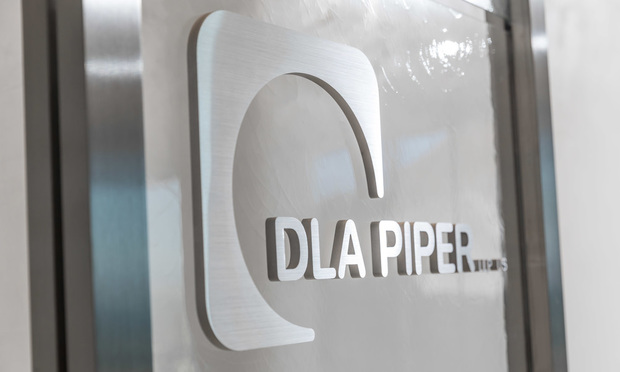DLA Piper's Ilana Eisenstein Will Co-Lead Penn Law's New Appellate Clinic
Eisenstein, a former federal prosecutor and assistant to the U.S. solicitor general, will share leadership duties with Penn Law professor Jean Galbraith.
August 22, 2019 at 02:55 PM
5 minute read
 DLA Piper in San Francisco Photo: Jason Doiy/ALM
DLA Piper in San Francisco Photo: Jason Doiy/ALM
This fall, nine "brave souls," undeterred by a 7:30 a.m. class start time, will be the first students in the new University of Pennsylvania Law School's appellate advocacy clinic.
The clinic joins a growing community of law school Supreme Court and appellate litigation clinics. But there's a difference, said clinic co-director Ilana Eisenstein, partner and co-chair of DLA Piper's appellate advocacy practice.

"I hope we will have some cases referred to us, that we take on, but the core of the work we hope we will do is adopting issues of importance that may be percolating not just in one case but in many cases in many jurisdictions," Eisenstein (at left) said. "We want to teach the students how do you create an advocacy strategy around key issues."
Eisenstein, a former federal prosecutor and assistant to the U.S. solicitor general, will share leadership duties with Penn Law professor Jean Galbraith, a former clerk to the late Justice John Paul Stevens.
What follows are some thoughts and plans Eisenstein shared about the new venture. The conversation was lightly edited for length and style.
Law.com: How did the idea for the clinic develop?
Eisenstein: Penn Law's been in the [clinic] waters for a long time in different capacities. It had a Supreme Court clinic for many years led by then-professor now-Judge Stephanos Bibas. It also has a longstanding externship for appellate advocacy that is going to continue.
But after Bibas left for the bench, I started talking to the law school about reincarnating it but looking at things through a broader lens, not just limited to the U.S. Supreme Court, but more broadly at appellate dockets in the federal courts of appeals and state appellate courts. From where I sit, the Supreme Court has a limited docket. There is huge competition for those cases among the clinics.
How will you develop a "broader lens?"
We are looking at working with existing and well-established legal advocacy organizations, both local and national, already tackling these issues. We don't need to recreate the wheel. These organizations don't have bandwidth to deal with all of these issues they face. We have a few lined up that we're excited about.
Some of our initial cases—we have a case on an immigration matter, some are focused on the criminal justice system, for example, bail and fees-and-costs issues being litigated in Pennsylvania, and criminal procedure cases as well.
But from a subject matter standpoint, we're not going to be limited in any particular respect. We're looking for issues and great partnerships we can engage on.
How large will the clinic be?
We're starting small. We have nine signed up. Particularly because of my schedule, we start at 7:30 a.m., and a few brave souls were willing to do so. We wanted to start small since this was our first year. I anticipate it will remain a seminar class. It's very hands on in terms of writing and developing cases. Both professor Galbraith and I will be focused on how to litigate these cases and issues.
What role, if any, will your law firm play?
We plan on working the cases with DLA Piper. They will all be pro bono matters. We'll look at these cases like the other pro bono cases we very frequently take on. It also will help support the cases outside of the school year because litigation goes on. From DLA's end, the firm will be part of the case continuity to keep them moving forward irrespective of the school year or vacation schedule.
The firm has been very supportive. We have a lot of our partners teaching as adjuncts in academic settings. We're all excited about this clinic.
At the same time, you are building an appellate practice at DLAPiper. How is it going?
I spent 12 years at the Department of Justice. I was a prosecutor for eight years and four years at the solicitor general's office. I was ready to move back home to Philadelphia. I was ready to have a broader range of clients. There's a lot of pride in representing the government and the United States. I've been very happy at DLA and building this appellate practice.
We already had some great colleagues and we brought on some new ones. There's a lot of need and desire for lawyers with appellate advocacy skills. Part of our thinking at the appellate clinic is the way I work in private practice. I'm not limited to courts of appeals; a lot of it is at the trial level. It's been busy.
Do you hope to return to the Supreme Court lectern, or do you miss those arguments?
I hope we'll have cases that land back there. Whatever forum, there's always opportunity for advocacy. I haven't wanted for chances at the podium. I am pretty regularly filing petitions and amicus briefs. I wouldn't rule that out. Frankly, it's not something I single-mindedly pursue. There are advocates that spend time trying to find those cases. That's not me.
Read more:
The Law School Pipeline for US Supreme Court Clerks
How Stanford's Pamela Karlan Got SCOTUS Argument Time in LGBT Cases
Stanford Law's Jeffrey Fisher, Joins O'Melveny as Special Counsel
NOT FOR REPRINT
© 2025 ALM Global, LLC, All Rights Reserved. Request academic re-use from www.copyright.com. All other uses, submit a request to [email protected]. For more information visit Asset & Logo Licensing.
You Might Like
View All
State Appellate Court Rejects Reasoning for Attorney's Removal From Conservatorship
5 minute read
'Pay What Is Owed': State Appellate Court Affirms $19M Verdict for Software Contractor
5 minute read
Statute of Limitations Shrivels $5M Jury Award to Less than $1M, 8th Circuit Rules
4 minute read
Standing Spat: Split 2nd Circuit Lets Challenge to Pfizer Diversity Program Proceed
Trending Stories
- 1Newsmakers: Former Pioneer Natural Resources Counsel Joins Bracewell’s Dallas Office
- 2Quiet Retirement Meets Resounding Win: Quinn Emanuel Name Partner Kathleen Sullivan's Vimeo Victory
- 3Avoiding the Great Gen AI Wrecking Ball: Ignore AI’s Transformative Power at Your Own Risk
- 4A Lesson on the Value of Good Neighbors Amid the Tragedy of the LA Fires
- 5Change Is Coming in the Trump Era. For Big Law, Change Is Already Here
Who Got The Work
J. Brugh Lower of Gibbons has entered an appearance for industrial equipment supplier Devco Corporation in a pending trademark infringement lawsuit. The suit, accusing the defendant of selling knock-off Graco products, was filed Dec. 18 in New Jersey District Court by Rivkin Radler on behalf of Graco Inc. and Graco Minnesota. The case, assigned to U.S. District Judge Zahid N. Quraishi, is 3:24-cv-11294, Graco Inc. et al v. Devco Corporation.
Who Got The Work
Rebecca Maller-Stein and Kent A. Yalowitz of Arnold & Porter Kaye Scholer have entered their appearances for Hanaco Venture Capital and its executives, Lior Prosor and David Frankel, in a pending securities lawsuit. The action, filed on Dec. 24 in New York Southern District Court by Zell, Aron & Co. on behalf of Goldeneye Advisors, accuses the defendants of negligently and fraudulently managing the plaintiff's $1 million investment. The case, assigned to U.S. District Judge Vernon S. Broderick, is 1:24-cv-09918, Goldeneye Advisors, LLC v. Hanaco Venture Capital, Ltd. et al.
Who Got The Work
Attorneys from A&O Shearman has stepped in as defense counsel for Toronto-Dominion Bank and other defendants in a pending securities class action. The suit, filed Dec. 11 in New York Southern District Court by Bleichmar Fonti & Auld, accuses the defendants of concealing the bank's 'pervasive' deficiencies in regards to its compliance with the Bank Secrecy Act and the quality of its anti-money laundering controls. The case, assigned to U.S. District Judge Arun Subramanian, is 1:24-cv-09445, Gonzalez v. The Toronto-Dominion Bank et al.
Who Got The Work
Crown Castle International, a Pennsylvania company providing shared communications infrastructure, has turned to Luke D. Wolf of Gordon Rees Scully Mansukhani to fend off a pending breach-of-contract lawsuit. The court action, filed Nov. 25 in Michigan Eastern District Court by Hooper Hathaway PC on behalf of The Town Residences LLC, accuses Crown Castle of failing to transfer approximately $30,000 in utility payments from T-Mobile in breach of a roof-top lease and assignment agreement. The case, assigned to U.S. District Judge Susan K. Declercq, is 2:24-cv-13131, The Town Residences LLC v. T-Mobile US, Inc. et al.
Who Got The Work
Wilfred P. Coronato and Daniel M. Schwartz of McCarter & English have stepped in as defense counsel to Electrolux Home Products Inc. in a pending product liability lawsuit. The court action, filed Nov. 26 in New York Eastern District Court by Poulos Lopiccolo PC and Nagel Rice LLP on behalf of David Stern, alleges that the defendant's refrigerators’ drawers and shelving repeatedly break and fall apart within months after purchase. The case, assigned to U.S. District Judge Joan M. Azrack, is 2:24-cv-08204, Stern v. Electrolux Home Products, Inc.
Featured Firms
Law Offices of Gary Martin Hays & Associates, P.C.
(470) 294-1674
Law Offices of Mark E. Salomone
(857) 444-6468
Smith & Hassler
(713) 739-1250








